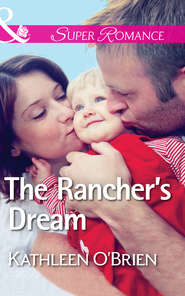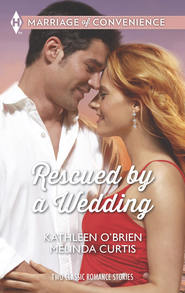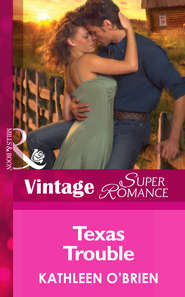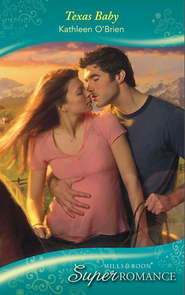По всем вопросам обращайтесь на: info@litportal.ru
(©) 2003-2025.
✖
The Daddy Deal
Автор
Год написания книги
2018
Настройки чтения
Размер шрифта
Высота строк
Поля
AT FIRST, she was speechless. He’d uttered the words casually, in the offhand way he might have expressed a dislike for broccoli, and she wasn’t at all sure how she should respond. Stalling, she brought her glass to her lips and drank, studying him over the rim, looking for a cue.
To her surprise, his green eyes were alight with an irreverent sparkle. It was infectious, and in spite of herself she felt a smile tickling at her lips. As she began to grin, she felt something odd happening inside her. It was as if a logjam of oppression burst loose with an almost audible pop, and she was washed by a sudden, delicious sensation of freedom.
“Now that you mention it,” she said, still grinning, “I can’t stand Clarke, either.”
“Oh?” He raised one brow.
Nodding, she took another sip, wondering whether this last glass might have pushed her judgment over the edge. Perhaps instead of being forthright and bold, she was merely being drunk. But did it really make any difference? She felt freer than she had in months. She felt good.
“Absolutely cannot stand him. So that makes two of us. Good thing we didn’t marry him, isn’t it?”
“Very.” The creases at the corner of his eyes grew more pronounced. “I for one am deeply relieved.”
“Me, too.” She stared into her champagne, then sipped again thoughtfully. “The bottom line,” she confided, “is that Mr. Clarke Westover is an assous pomp.”
But that hadn’t come out quite right. “A passous...” She frowned and gave up. “A jerk.”
She punctuated her pronouncement by swigging an emphatic mouthful of bubbles, but just as she did so, she glimpsed the smile quirking Taylor’s lips. Immediately, a dangerous spasm of answering laughter tightened her chest. She swallowed quickly and lowered her glass, trying not to spill the champagne as she began to giggle. But the table was small, and her aim was faulty. She knocked her glass against the edge of his, and the stern rocked dangerously. It finally righted itself, but not before spraying a fine mist of liquid across the outer edge of her hand and onto the tabletop.
“Hey,” he said, leaning over to dab the moisture from her knuckles with the handkerchief he bad once again magically produced. “Careful. We’re never going to get our money’s worth out of this champagne if you keep flinging it around like that.”
Our money’s worth. She noticed how instinctively thoughtful he was, how even his pronouns were chosen to minimize her self-consciousness. His touch was very deft, almost impersonal—it held no hint of sleazy opportunism. Over his ministering hand, they smiled at each other in a companionable harmony.
She knew she should feel like a fool. And yet somehow she wasn’t at all embarrassed. He had a gift for making people comfortable, she realized, though perhaps it was merely a lucky by-product of his own sublime self-confidence.
“I’m sorry,” she said sheepishly, shoving her glass to one side. “A friend of mine once had a great word for this. Spiff—” she struggled to get her lips around the syllables correctly “—spifSicated.” She smiled. “I’m afraid I’m getting spifflicated.”
“No, you’re not.” He picked up her hand and swabbed champagne efficiently from the underside. “In fact, in some counties they use that as a legal test. If you can actually pronounce ‘spifflicated’, you’re not.”
“Still,” she said, eying the last two inches of golden bubbles in her glass and shuddering. “That’s it for me.”
She knew, even as she said it, that he might interpret her words as the excuse he needed to get up and say goodbye. His chivalrous mission was accomplished—he had rescued her from Clarke’s petty cruelties. He had loaned her a quarter, paid the astronomical auction bill and wiped her fingers. He had even salvaged her pride—letting everyone in the room see that, though Clarke had abandoned her, she was not entirely friendless. Best of all, he had made her laugh.
It was more unselfish generosity than she had ever received from anyone, much less from a total stranger. She had no right to expect more. Or even to wish for it. She had to let him leave now, if he wanted to.
But he made no move to stand. Instead, he poured himself another glass of champagne and leaned back, stretching his shoulders against the iron rim of the chair, getting comfortable. Her hopes shot up like a kite in a gusting wind, and she suddenly realized how much, how very much, she had hoped he would stay.
“You were with someone earlier,” she began hesitantly, strangely reluctant to broach the subject, but knowing she had to. There was no point in letting herself dream if that slinky brunette was going to return from the ladies’ room any minute and reclaim her white knight. “Is she still here?”
“No,” he said, meeting her gaze directly, without a trace of self-consciousness. “She wasn’t my date. I met her only a couple of hours ago. In fact, I don’t really know most of the people here. I don’t live in Florida. I’m from Massachusetts, from a little town in the Berkshires.”
Not from Tampa, then—not even a Floridian. She couldn’t have been more surprised. He had certainly looked right at home with this crowd. She supposed that being very, very rich was like belonging to an exclusive fraternity—no matter where you traveled, you could always look up the local chapter and be assured of fitting right in.
Still, she knew the tickets to this fund-raiser had been exorbitant. Surely there were places back home in the Berkshires with more legitimate claim on his charity. “So why are you here?” She waved her hand toward the stage. Then she worried—had that sounded rude? She seemed to have dropped her tact down the bottom of that last champagne bottle. “I mean, this is just a little local theater. Why would you come here... ?”
He narrowed his eyes thoughtfully and took another slow swallow of champagne. He held her gaze so long she began to wish she hadn’t asked. Perhaps he thought she was overstepping the bounds of their extremely short acquaintance. He couldn’t understand, couldn’t even know, that she felt strangely as if she’d known him a long, long time. She couldn’t even really understand it herself.
Finally he smiled. “If I said I came here to see you, you probably wouldn’t believe it; would you?”
She grinned and shook her head. “I think that line only works after three bottles.”
“I was afraid of that.” He spread his hands, palms up, surrendering the notion. “Actually, I’m in Tampa because—” he paused “—because I have family here.”
“Not a wife, though?” She could hardly believe her audacity. But it seemed, in her champagne logic, to be better dealt with now than later.
He shook his head. “Not a wife.”
“Or a girlfriend?”
He shook his head again, and a reluctant smile crooked his mouth appealingly. “Not even female.”
“Good.” She relaxed as if she had settled a question of major philosophical importance. “Then you don’t have to leave.”
“No. I’m free to indulge my own pleasure tonight.” He picked up his glass and swirled the liquid in it, as if admiring the way the bubbles burst golden under the electric starlight. “And it would please me very much to spend the evening with you.” He glanced up. “Assuming, of course, that you’re equally free.”
She waved her hand toward the exit through which Clarke had so recently slipped. “Well, as you can see, I have no date—”
“And no one waiting at home, wondering where you are?”
She shook her head. “The only male at my house is two years old, and he’d better not be wondering anything. He’d better be sound asleep.” She raised her chin slightly. “Justin is my son.”
This, too, seemed like something she needed to make clear from the outset. A lot of men remembered they had urgent appointments elsewhere the minute they learned she had a child. She watched Taylor’s handsome face carefully, looking for the familiar signs of shock, disappointment or disapproval. A son, but no husband...
His expression was hard to read. He didn’t look threatened, and he certainly didn’t exhibit any moral indignation. But he did look intensely interested, thoughtful, somehow, as if he were trying to assemble a picture that wouldn’t quite come together for him. That was all right, she decided. A little mystery did more to enhance a woman’s appeal than a boatload of diamonds. And she did want to appeal to him. She wanted it with a raw intensity that was growing stronger by the minute.
“Tell me,” he said finally, his green eyes quizzical, “when you said you were glad you hadn’t married Westover, was that just an academic observation? Or had you really considered it?”
“Considered it?” She shook her head again, as if she could hardly believe the truth herself. “I was his fiancée for almost two years.” Looking down at her now-unadorned left hand, she sighed. “Of course, I was out of the country for one of those years, so it’s only half as stupid as it sounds.”
“Why?”
“I don’t know, really. I’ve asked myself that a hundred times.” She gazed toward the door, where she had last seen Clarke. “I guess it’s because, though you’d never know it from tonight’s performance, he can charm the petals off a rose when he wants to. And because I was lonely—”
She stopped, something in his expression suddenly warning her that she was answering the wrong question. She flushed. “Oh...you mean why was I out of the country for a year?”
He nodded. “You have to admit it’s...different. Your average, hot-blooded American woman, upon becoming engaged, doesn’t just grab her passport and emigrate.”
“Well, I was already committed to going overseas before Clarke asked me to marry him,” she explained rather heatedly, as if he had accused her of possessing a tepid nature. Of being passionless. “People were counting on me. I’m a nurse, and I was part of a volunteer medical team our hospital sponsored. The country we were sent to was being torn apart by civil war.”
She leaned forward, squeezing her hands together, trying to make him feel the urgency of her obligation. It wasn’t fair for him to judge her. She wasn’t a cold woman, though Clarke had used that argument against her frequently. She wasn’t. “People were dying.”
“Well, then, of course you had to go,” he said, running his fingers lightly over her whitened knuckles, his smile reassuring. “And if Clarke Westover had been half a man, he would have packed up his fax machine and gone with you.”
She tried to smile back, but foolish tears were pooling along her bottom lids, and she had to look away, afraid that he would see them. She wasn’t sure why she suddenly felt like crying. Perhaps the memories of that desperate, blood-soaked year were too close. Or perhaps it was because no one had looked at her like that in a long time, with sympathy and understanding and... amazingly, there was admiration, too.... No, not in a very long time.
Or maybe it was just the champagne. Get a grip, she told herself. If you turn into one of those dismal, weepy drunks, this white knight of yours will disappear faster than you can say spifflicated.
“What’s wrong?” Taylor’s hand settled over hers, cupping her tense fingers in his cool, soothing palm. “Is it about Clarke?”











